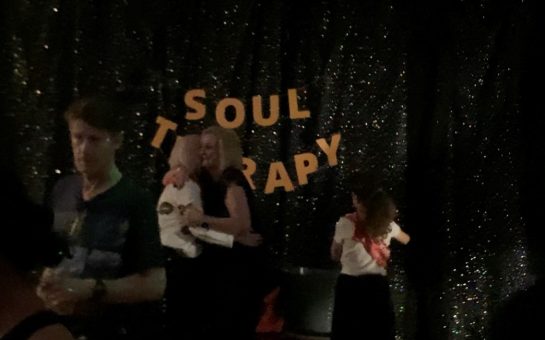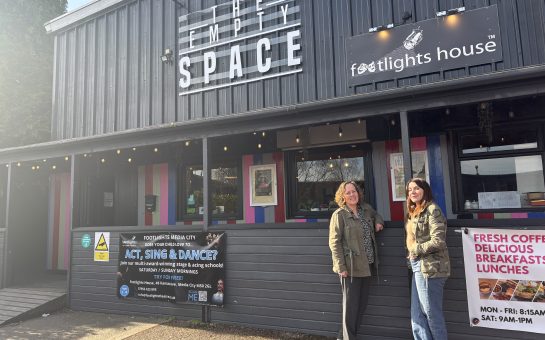Manchester will be transformed into a maelstrom of flashing armbands and runners on Wednesday November 11, as thousands take part in the Run in the Dark, a charity five and 10 kilometre run around the streets of Salford Quays.
The night-time event styles itself as more than just a charity run, with 25,000 runners taking part simultaneously across the world in 50 different cities ranging from Dublin to San Francisco.
The Run in the Dark, which began in 2012, is held in aid of the Mark Pollock Trust as it continues to search for a cure for spinal cord injuries.
With several of your correspondents nervously donning their running shoes and preparing to pound the streets, MM spoke to running coach John O’Regan about the vital ingredients for a perfect long-distance race.
Train…
It might sound like a truism, but training is vital to a perfect race.
O’Regan, 46, believes that a structured programme, details of which are posted on the official Run in the Dark website, has more than just physical benefits.
“If you go into an exam, and you know you’ve done the study, you would have the confidence when you’re going into it, and that’s the same when you’ve done the training,” he says.
“If you’ve prepared as best as you can, it’s easier to accept the outcome of the day.
“I started applying a bit of structure, my mind is a lot clearer, I’m enjoying it, and I’m getting the results.”
…but not too much
Nearing the evening of the Run in the Dark, the temptation might be to overdo it.
By gradually calming the intensity of training, or tapering, the effect can be manifold, but O’Regan warns of its potentially deceptive qualities.
“It’s always good to have a bit of a plan, so when you get there you will have rested and done a little bit of taper beforehand, so your legs will have a bit more zip in them.
“Don’t start thinking, ‘Hey I’m feeling really good now, maybe I can do a little bit more’. Stick with your plan, and train for where your fitness is.”
Improve yourself little by little
Marginal gains, one-percenters; call them what you want, few can deny that this attention to detail has been one of the most revolutionary concepts in sport in recent times.
O’Regan took up running seriously at the relatively late age of 31, and now, 15 years later, he’s constantly looking for an advantage, whether running 5k in Cork for Run in the Dark or 256k in the Atacama Desert.
“You’re going to find out if your shoelaces are too tight, maybe you’ve left the keys in the pocket of your shorts; it’s these little things that you know you have to overcome; I call all these things the one-percenters.
“One per cent on its own is nothing, but when you add up a few of them – checking your shoelaces, maybe you’ve left the keys in the pocket of your shorts, that’s one per cent each – and all of a sudden, you’ve ten per cent that can make a difference to your race.”
Don’t go off too fast
Everyone has done it: months of training and best-laid plans go to waste as adrenalin and positive energy takes over and previously casual runners hare off at a pace that would make Mo Farah blush.
For O’Regan, the solution isn’t simple, but you can minimise that risk with a simple warm-up.
“Going off too fast means that you’re going off at a pace that your body isn’t prepared to do, so if you do a little bit of a warm-up beforehand, you’re getting the blood flowing, you’re getting your heart-rate elevated.
“Before a race starts, you’re going to feel that bit of nervousness and anxiety, there’s that adrenalin building up, that fight-or-flight syndrome, and all of a sudden you’re just releasing that, but if you release some of that beforehand, you will be in a much more relaxed state.”
Enjoy it!
The idea of a first long-distance run may make the concept of enjoyment a far-fetched one, but with community spirit at the heart of the Run in the Dark, the crowds and the sense of civic pride should be enough to carry you over the finish line.
“For your first 10k, you’re looking for a benchmark time, something that you can make comparisons to, so look at the first run as being a measure,” O’Regan says.
“Run in the Dark is more than a race, it’s an event with the whole atmosphere around it: you just feel that positive energy at the start, there’s just something special about it.
“It’s a magical night, and you want to finish and still be in a good condition to enjoy it.”
John O’Regan Ultrarunner Official Run In The Dark Coach from Mark Pollock Trust on Vimeo.
For further information and to sign up, visit Welcome
Image courtesy of Mark Pollock Trust via Vimeo, with thanks.



